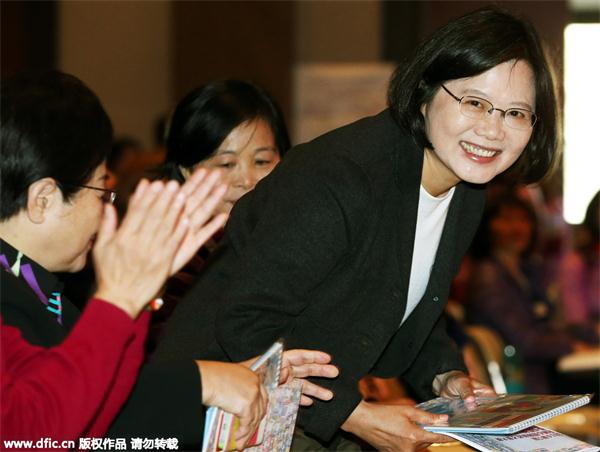Here's why Tsai must endorse 1992 Consensus
Updated: 2016-05-04 08:23
By DENNI S V. HICKEY(China Daily)
|
||||||||
 |
|
Democratic progessive party leader Tsai Ing-wen attends to the talent competition of children with mental disabilities in Taiwan. [Photo/IC] |
Following Ma Ying-jeou's election in 2008, Taiwan endorsed the 1992 Consensus. Under this arrangement, both Taiwan and the Chinese mainland accept the principle of "one China", but each side holds its own interpretation of what that means.
By doing so, Ma enabled cross-Straits relations to move forward. Negotiations between Taiwan's Straits Exchange Foundation and the mainland's Association for Relations Across the Taiwan Straits re-opened for the first time in more than a decade. By 2016, senior cross-Straits officials from the two sides had met seven times and a total of 23 cross-Straits agreements had been signed. The number of direct cross-Straits flights soared from zero to 120 per day. Millions of mainland tourists visited Taiwan. And the mainland is now the island's largest trading partner.
International observers praised the progress in cross-Straits relations. Support for the rapprochement was even enshrined in the 2010 National Security Strategy of the United States. Even US President Barack Obama declared:"I am very pleased with the reduction of tensions and the improvement in cross-Straits relations."
Ma's solid achievements in cross-Straits relations represented a conundrum for Tsai Ing-wen's election campaign because her Democratic Progressive Party still supports "Taiwan's independence". An endorsement of the 1992 Consensus might have alienated key DPP constituencies. But an open abandonment of the 1992 Consensus would have provoked the mainland, frightened Taiwan compatriots and alarmed the global community.
In order to cope with the challenge, Tsai opted to sidestep the issue by claiming to support the status quo and handle relations with the mainland in accordance with "the will of the Taiwan people" and "Taiwan constitution". Throughout her campaign, she refused to elaborate on her vague approach to cross-Straits relations.
The election campaign is now over and Tsai will assume the island's leadership on May 20. She could use the opportunity to explicitly endorse the 1992 Consensus. And she has five reasons to do so.
First, Tsai was careful not to reject the 1992 Consensus during her campaign. Rather, she described it as an "option". On May 20, Tsai will possess the power to choose or reject an option. Hopefully, she will choose wisely.
- Global health entering new era: WHO chief
- Brazil's planning minister steps aside after recordings revelation
- Vietnam, US adopt joint statement on advancing comprehensive partnership
- European border closures 'inhumane': UN refugee agency
- Japan's foreign minister calls A-bombings extremely regrettable
- Fukushima impact unprecedented for oceans: US expert

 Stars of Lijiang River: Elderly brothers with white beards
Stars of Lijiang River: Elderly brothers with white beards
 Wealthy Chinese children paying money to learn British manners
Wealthy Chinese children paying money to learn British manners
 Military-style wedding: Fighter jets, grooms in dashing uniforms
Military-style wedding: Fighter jets, grooms in dashing uniforms
 Striking photos around the world: May 16 - May 22
Striking photos around the world: May 16 - May 22
 Robots help elderly in nursing home in east China
Robots help elderly in nursing home in east China
 Hanging in the air: Chongqing holds rescue drill
Hanging in the air: Chongqing holds rescue drill
 2.1-ton tofu finishes in two hours in central China
2.1-ton tofu finishes in two hours in central China
 Six things you may not know about Grain Buds
Six things you may not know about Grain Buds
Most Viewed
Editor's Picks

|

|

|

|

|

|
Today's Top News
Liang avoids jail in shooting death
China's finance minister addresses ratings downgrade
Duke alumni visit Chinese Embassy
Marriott unlikely to top Anbang offer for Starwood: Observers
Chinese biopharma debuts on Nasdaq
What ends Jeb Bush's White House hopes
Investigation for Nicolas's campaign
Will US-ASEAN meeting be good for region?
US Weekly

|

|








